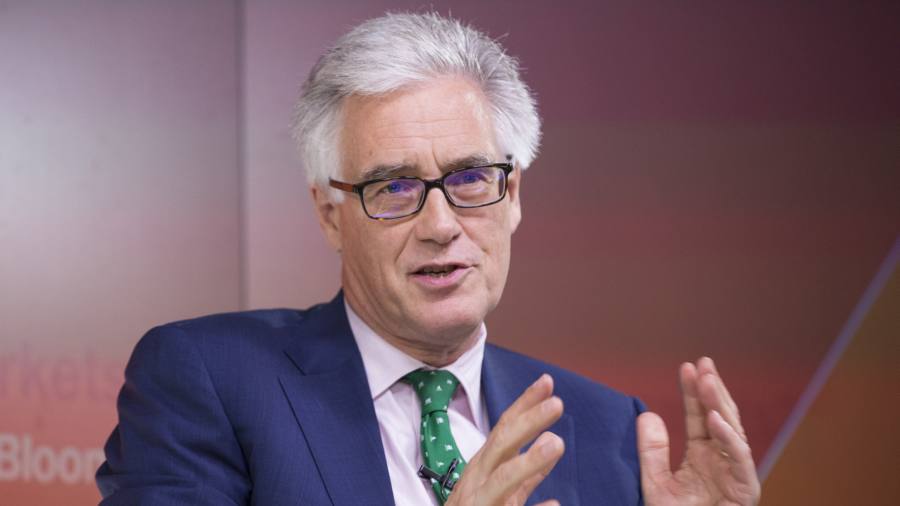
This article is an on-site version of our Moral Money newsletter. Sign up here to get the newsletter sent straight to your inbox.
Visit our Moral Money hub for all the latest ESG news, opinion and analysis from around the FT
So much for Green Day. The UK government’s flurry of announcements on energy policy yesterday contained no big bazooka of green subsidy pledges to counter the huge incentive packages wheeled out by Washington and then Brussels. That will add to concerns about green investment drifting abroad, despite chancellor Jeremy Hunt’s promise that the government will “mitigate against those risks” in the months ahead.
Yesterday was not a total nothing-burger. The decision to review the fiduciary duties of pension fund trustees in relation to climate and energy transition risks is significant. So too is the announcement of a consultation on making all large companies — not just listed ones — publish plans for managing the energy transition.
But Rishi Sunak’s government remains under real pressure for much more substantial steps. Below we highlight a call for one such measure from Adair Turner, formerly the UK’s top financial regulator and chair of its Climate Change Committee. Also today, I look at the investment funds that say they can help the world tackle its worsening water challenges. Have a good weekend. — Simon Mundy
Adair Turner: UK government is ‘stuck in the headlights’ on heating policy
In the 15 years since Adair Turner became the first chair of the Climate Change Committee (CCC), an advisory body to the UK government, the country has made erratic progress on green policy.
This week the CCC warned that the government is “strikingly unprepared” to protect key sectors such as agriculture from climate impacts. The National Audit Office, meanwhile, wrote this month that the government lacks a clear delivery plan for its goal of decarbonising the power sector by 2035.
Turner, now chair of the Energy Transitions Commission (ETC) think-tank, reckons the biggest worry at the moment is not electricity, but heat.
“I don’t think we’ve ever had a clear strategy for what we’re going to do about it,” he told me. Successive governments, Turner said, have been equivocating over whether to focus on supporting the rollout of electric heat pumps, or on developing a hydrogen pipeline system for heating homes. “They’re sort of stuck in the headlights,” he said.
Turner urged the government to throw its weight behind heat pumps, arguing this would prove more efficient than a hydrogen-based system. That still leaves open the question of how households can be incentivised to make the switch from gas boilers.
The government currently has a scheme offering £5,000 grants to early adopters of heat pumps, which typically cost around £10,000 to purchase and install. But it will only run until 2025, and the Treasury has earmarked just £450mn for the initiative. Yesterday the government announced an additional £30mn “Heat Pump Investment Accelerator”, which it hopes will galvanise nearly 10 times as much private investment into heat pump production and supply.
A more robust, sustainable solution, Turner believes, lies with a new publicly owned green infrastructure investment bank. The UK launched such a body in 2012 – only to sell it to Australia’s Macquarie Group five years later. But a new report from ETC argues that developed countries should think more carefully about the targeted roles that such institutions can play in their domestic economies.
The proposed bank wouldn’t need to get involved in things like wind power, Turner said — “there’s enough capital in the private sector, which will queue up to do offshore wind farms”.
But on the question of “who is going to finance at a good low rate 20mn separate households” to spend thousands of pounds apiece on greening their heating systems, he said, that’s another matter. “You can’t just leave it to the private sector. It needs some strategic vision.” (Simon Mundy)
Water funds: ‘Sooner or later, people are going to get it’

Last week’s UN world water conference in New York — the first such event for 46 years — was a valuable step towards tackling a chronic crisis.
On the eve of the summit, a UN report warned that 933mn people are already facing water scarcity in the world’s towns and cities — a figure that it said could more than double by 2050.
So the Water Action Agenda announced at the conference, under which hundreds of governments and businesses committed to better water stewardship, was an important signal of intent — but there was disappointment at the vagueness of many pledges, particularly around money matters.
This is where there’s opportunity for private sector money managers to play a role.
Incofin, the Belgium-based impact investment firm, offers one example with its Water Access Acceleration private equity fund, announced last week, which will invest in companies working to promote safe drinking water access.
Dina Pons, managing partner at Incofin, told me the fund would invest in three main categories of companies: businesses that sell safe water in bottles or barrels to low-income households; enterprises that build water pipe networks to serve poor communities; and others pursuing technological solutions to drinking water challenges.
It has raised an initial €30mn from investors, including French corporations Danone and BNP Paribas, and Scandinavian development finance institutions Norfund and IFU. Crucially, the US Agency for International Development has provided a chunk of capital that will take the first hit in the event of losses. Pons hopes this “blended finance” approach will help to draw interest from private sector investors by reducing their risk.
Even then, Pons conceded, the fund’s appeal may be limited by its focus on low-income communities, which she said means it can’t pursue bumper returns.
“You need to make sure that the ultimate product remains affordable, and suited to the purchasing power of ‘bottom of the pyramid’ people,” she said. “That requires patient capital, investors who are excited about this type of social mission and are OK with the type of high single-digit returns that the fund wants to target.”
Other funds, with a mandate to invest in a wider range of water-focused companies, are aiming for much larger profits. US-based Burnt Island Ventures, founded in 2021, is targeting average annual returns of more than 20 per cent with investments in tech start-ups that boost “water management, access and security globally”.
It’s so far deployed $21mn of capital into 18 companies that offer real-time monitoring of drinking water contamination, or of water pipe leaks; reduce water wastage by hotel showers, or by garden sprinklers; filter heavy oils from water, or convert wastewater into solid salts.
Other water-focused venture funds include Canada’s XPV Water Partners and Amsterdam-based PureTerra. But Burnt Island managing partner Tom Ferguson argued this space is still broadly neglected by most venture investors. Despite the centrality of water challenges to so many aspects of the climate crisis, he pointed out, water accounts for a tiny fraction of the increasing billions being pumped into climate tech.
There’s scepticism, too, about the impact made on the world’s water problems by the small crop of water funds aimed at retail investors. As the FT’s Alice Ross noted last month, some of these do little more than “buying utilities with stable returns”.
But after “20 years of under-investment” in water infrastructure in the developed world, along with the dire lack of access in developing countries, water needs all the investor attention it can get, said Bertrand Lecourt, who manages JO Hambro’s Regnan Sustainable Water and Waste fund, launched in 2021.
The fund invests in companies whose services can help protect safe water supplies, such as wastewater treatment company Evoqua, as well as others focused on solid waste disposal (including human bodies — one holding is the US funeral home and cemetery operator Service Corporation International).
Lecourt predicts that water infrastructure companies are set for a long period of rising demand for their services, as climate change drives chronic water stress around the world. Another attraction for investors is the risk diversification, he said: a water management company in Shanghai faces a very different set of potential threats than a pipe manufacturer in California.
For now, water-focused funds and strategies remain a tiny feature of the investment landscape. But it’s only a matter of time until the wider financial industry wakes up to the importance of this space, Ferguson said.
“People are going to get it sooner, or they’re going to get it later. But at some stage, they’re going to get it.” (Simon Mundy)
Smart reads
-
The FT’s Lex column takes a look at the booming financial performance of index provider MSCI, which is set to overhaul the ESG rating business that has become a major earnings driver.
-
Last year, several major economies pledged $20bn in support for Indonesia’s transition from coal power. South Africa has agreed a similar “just energy transition programme”, worth $8.5bn. But the packages contain such a broad mix of financing forms that those headline numbers are worryingly misleading, argues Harvard’s Ricardo Hausmann.
Recommended newsletters for you
FT Asset Management — The inside story on the movers and shakers behind a multitrillion-dollar industry. Sign up here
Energy Source — Essential energy news, analysis and insider intelligence. Sign up here